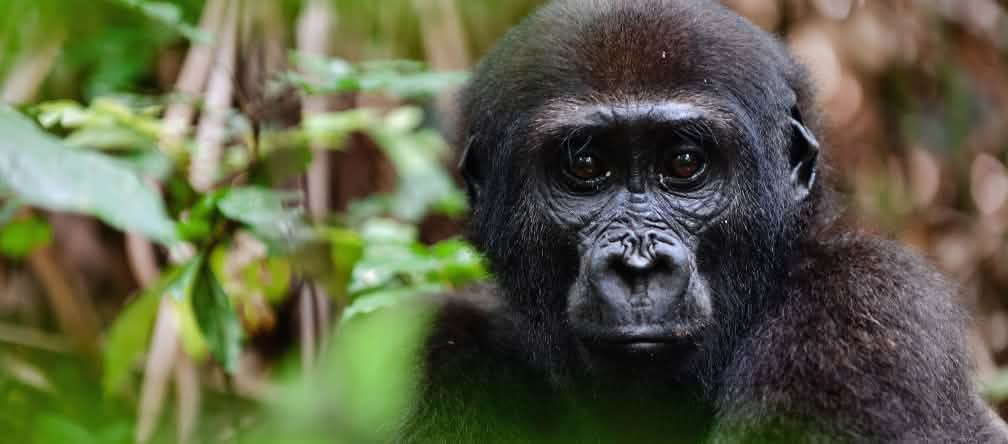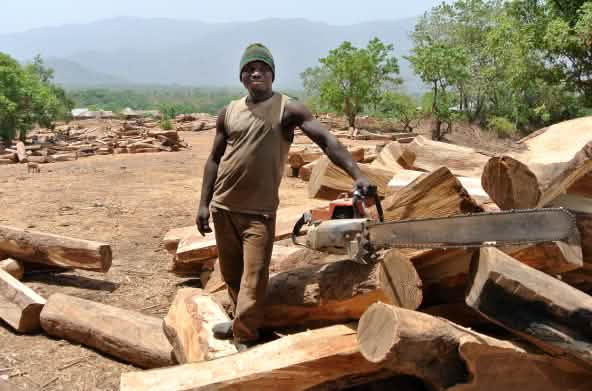
Completed campaign
Stop the advance of oil palm plantations in Gabon!
A Singapore-based agribusiness corporation wants to clear half a million hectares of rainforest in Gabon – an area more than three times the size of London! – for oil palm and rubber plantations. Local communities are not taking this lying down and are calling for your support. Please sign our petition!
To: the government of Gabon and OLAM INTERNATIONAL / SOTRADER
“Stop the advance of oil palm plantations in Gabon!”Dozens of communities live on the land that the government of Gabon gave in concession to OLAM INTERNATIONAL, a major transnational agribusiness company based in Singapore that operates in over 70 countries.
These communities depend on the forests and savannas for their livelihoods, which are based on agriculture, hunting, gathering and fishing. Ever since OLAM began its operations, the company and its plantations have brought great destruction to the communities’ territory.
The communities of Ferra and Nanga in southern Gabon decided to unite to say NO to the expansion of OLAM’s plantations. They drafted a petition, in which they state that they do not accept the company’s advance onto yet another part of their traditional territory, on the left bank of the Dola River, which is very close to their villages.
The communities will deliver their petition, as well as the signatures we are collecting from international supporters on the Rainforest Rescue site, to the authorities and the company on the eve of the International Day of Struggle Against Tree Plantations, which is celebrated on September 21st.
The communities of Ferra and Nanga are asking for your support. Please sign our petition in solidarity with these communities’ demand to reclaim their traditional territory, which is essential for them to maintain their way of life—today and in the future!
The full text of the English version of the communities' petition can be found on the website of the World Rainforest Movement (WRM).
As part of diversifying its economy, and with the aim of achieving food self-sufficiency and reducing rampant unemployment, Gabon launched an ambitious program in 2015 called GRAINE. On the ground, implementation of this program was entrusted to SOTRADER, a public-private partnership between the government of Gabon and multinational company, Olam Palm Gabon.
GRAINE was established in Ndendé in the province of Ngounié, where SOTRADER set up its headquarters. There, it began development of food crops, and most notably, acquired a concession of 58,400 hectares to develop oil palm plantations.
The plantations were to be managed by local communities, through newly established agricultural cooperatives and a process of free, prior, informed consent that was influenced by people with political-administrative affiliation. In reality, the communities of Nanga and Ferra located at the heart of the concession area have been left totally isolated and in a precarious situation.
To: the government of Gabon and OLAM INTERNATIONAL / SOTRADER
Ladies and Gentlemen,
We stand in solidarity with the communities of Nanga and Ferra, which have expressed their opposition to the development of oil palm plantations by the Olam / SOTRADER companies along the Dola River (on the left side, leaving Mouila):
- The forests and biodiversity—which are central to their traditional values, from where they obtain their essential economic and cultural resources, but to which they now have limited access—are literally destroyed, which may aggravate climate change-related impacts;
- The lands that they use to feed they families and communities are taken away from them. Food becomes scarce, and hunger gradually settles in;
- The nice promises made to the communities are never fulfilled.
The inhabitants of the villages of Ferra and Nanga demand that the multinational company OLAM and SOTRADER return their lands located on the left bank of the Dola River (coming from Mouila) in order for them to continue enjoying their customary use rights for production and harvesting activities, and to guarantee the food security and sovereignty of their communities—as recognized in the United Nations Declaration on the rights of peasants and other people who work in rural areas.
Yours faithfully.
The issue – rainforest on our dinner tables and in our fuel tanks
At 66 million tons annually, palm oil is the most commonly produced vegetable oil. Its low world market price and properties that lend themselves to processed foods have led the food industry to use it in half of all supermarket products. Palm oil can be found in frozen pizzas, biscuits and margarine, as well as body creams, soaps, makeup, candles and detergents.
Few people realize that almost half of the palm oil imported into the EU is used as biofuel. Since 2009, the mandatory blending of biofuels into motor vehicle fuels has been a major cause of deforestation.
Oil palm plantations currently cover more than 27 million hectares of the Earth’s surface. Forests and human settlements have been destroyed and replaced by “green deserts” containing virtually no biodiversity on an area the size of New Zealand.
The impact – suffering and death in producer countries, climate havoc
The warm, humid climate of the tropics offers perfect growth conditions for oil palms. Day after day, huge tracts of rainforest in Southeast Asia, Latin America and Africa are being bulldozed or torched to make room for more plantations, releasing vast amounts of carbon into the atmosphere. As a consequence, Indonesia – the world’s largest producer of palm oil – temporarily surpassed the United States in terms of greenhouse gas emissions in 2015. With their CO2 and methane emissions, palm oil-based biofuels actually have three times the climate impact of traditional fossil fuels.
Palm oil is not only bad for the climate: As their forest habitat is cleared, endangered species such as the orangutan, Borneo elephant and Sumatran tiger are being pushed closer to extinction. Smallholders and indigenous people who have inhabited and protected the forest for generations are often brutally driven from their land. In Indonesia, more than 700 land conflicts are related to the palm oil industry. Human rights violations are everyday occurrences, even on supposedly “sustainable” and “organic” plantations.
As consumers, we are largely unaware of these broader issues, yet our daily palm oil consumption also impacts our health: refined palm oil contains large amounts of harmful fatty acid esters that are known to damage DNA and cause cancer.
The solution – a revolution on our dinner tables and in our fuel tanks
Only 70,000 orangutans still roam the forests of Southeast Asia, yet the EU’s biofuels policy is pushing them to the brink of extinction. Every new plantation on Borneo is destroying a further piece of their habitat. Stepping up the pressure on policymakers is a must if we want to save our tree-dwelling kin. Apart from that, however, there is still a lot we can do in day-to-day life.
Follow these simple tips to recognize, avoid and combat palm oil:
- Enjoy a home-cooked meal: Use your imagination: why not try almond-coconut-pear biscuits? Or pizza with potato and rosemary? A meal cooked from fresh ingredients beats processed foods containing palm oil every time. Oils such as sunflower, olive, rapeseed or flaxseed are ideal for cooking and baking.
- Read labels: As of December 2014, labeling regulations in the EU require food products to clearly indicate that they contain palm oil. However, in the case of non-food items such as cosmetics and cleaning products, a wide range of chemical names may still be used to hide the use of palm oil. A quick check of your favorite search engine will turn up palm oil-free alternatives, however.
- Remember that the customer is king: Ask your retailers for palm oil-free products. Write product manufacturers and ask them why they aren’t using domestic oils. Companies can be quite sensitive to issues that give their products a bad name, so inquiring with sales staff and contacting manufacturers can make a real difference. Public pressure and increased awareness of the problem have already prompted some producers to stop using palm oil.
- Sign petitions and write your elected representatives: Online campaigns put pressure on policymakers responsible for biofuels and palm oil imports. Have you already signed all of Rainforest Rescue’s petitions?
- Speak out: Protest marches and creative action on the street raise public and media awareness of the issue, which in turn steps up the pressure on policymakers.
- Leave your car at home: Whenever you can, walk, ride a bicycle or use public transport.
- Be informed and inform others: Big Business and governments would like us to believe that biofuels are good for the climate and that oil palm plantations are sustainable. Spread the word – share this information with your family and friends and encourage them to rethink their consumption habits. It’s in our hands!

